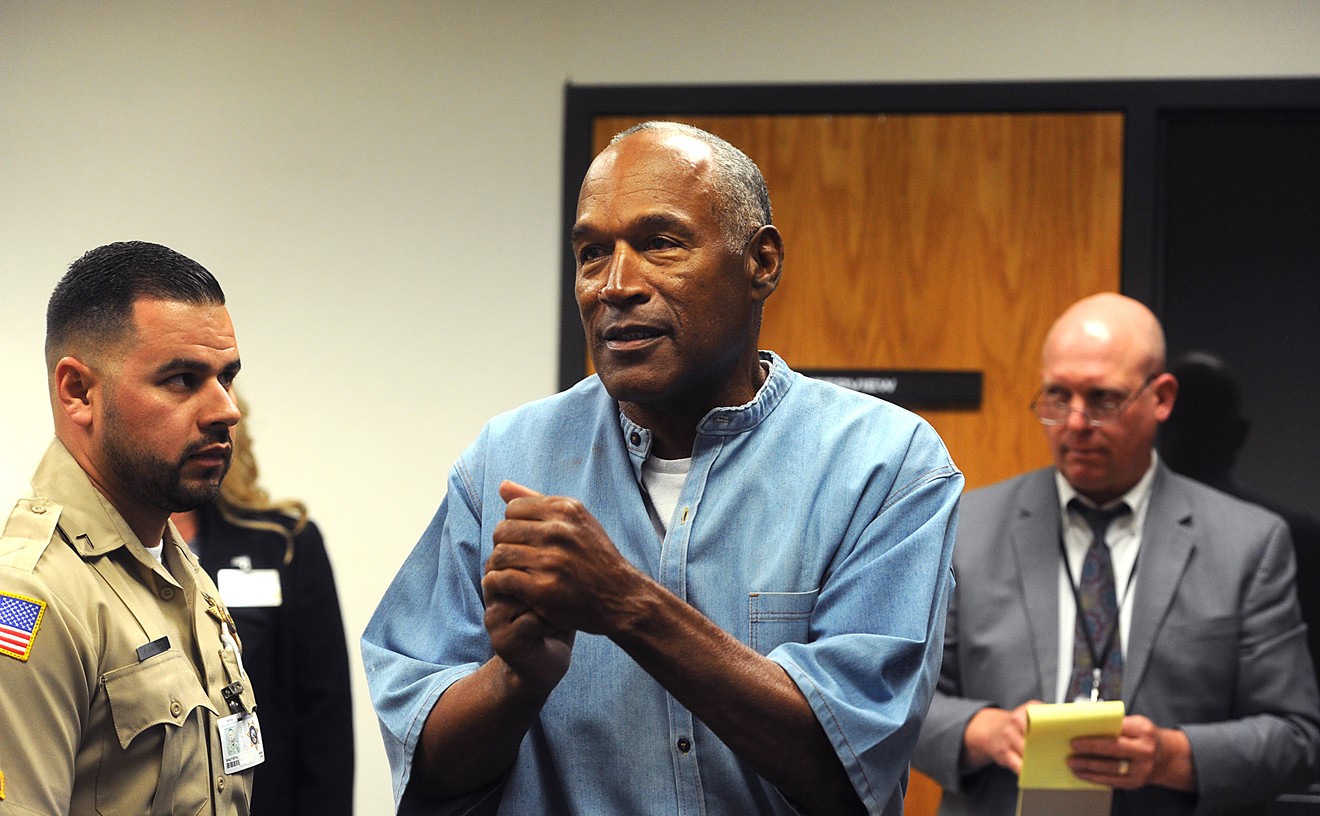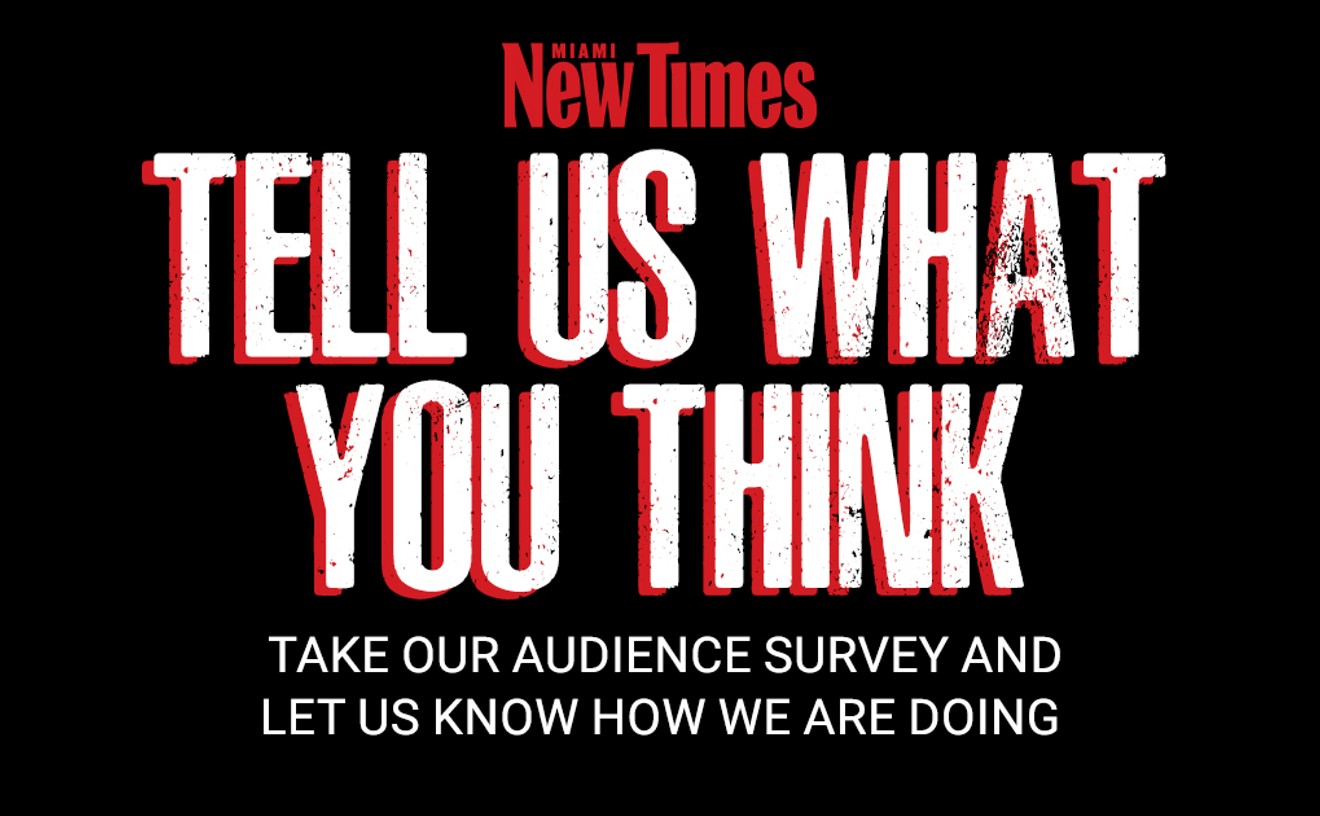Picture yourself in a nice linen suit, a straw fedora, and a diamond pinkie ring. You're strolling out of your Ocean Drive hotel on a breezy November Saturday. You step behind the wheel of your rented Bentley golf cart and tool over to Joe's Stone Crab. After you and some pals finish off some hearty claws, you head a few blocks north to the largest and flashiest poker room this side of Vegas.
Waitresses in slinky outfits deliver drinks. You find a seat at a table for a Texas hold 'em game where the minimum bet is a cool five grand. That moment transports you back to the days when guys like Al Capone and Meyer Lansky were laying down bets at the Miami Beach Kennel Club on First Street and then playing high-stakes poker and dice games at the Saxony Hotel on Collins Avenue.
This is the life, you think. To hell with Sin City.
Miami Beach Vice Mayor Jerry Libbin thinks it can happen. "It's a real possibility," he says. "It could generate millions of tourism dollars for Miami Beach."
It would all sound like so much hot air were it not for one important fact: The Havenick family, which recently opened the mammoth Magic City Casino in Little Havana, has for 30 years been quietly renewing a gambling license that just might make the whole thing possible.
That license allowed the Miami Beach Kennel Club to operate a poker room from 1929 until it closed in 1980. Because Miami-Dade voters OKed casinos on parimutuel sites in 2008, Libbin believes a poker room could be opened, preferably inside the Miami Beach Convention Center.
He recently met with Magic City Casino executive vice president Izzy Havenick to discuss how Miami Beach could bring back gambling. "Izzy told me they have legal standing to open some type of gambling without a voter referendum or any approval from the city commission," Libbin says. "They could open inside a hotel, but obviously a hotel would want to share in the revenues."
The Miami Beach Kennel Club was Florida's first dog track when famed boxing and race promoter Tex Rickard opened it 81 years ago at First Street and Collins Avenue, just steps from the legendary Joe's. During the roaring '20s, racetracks and illegal booze were part of the milieu that transformed Miami Beach into an American Rivera. The moneyed crowd, with names such as William Kissam Vanderbilt and Coleman du Pont, established beachheads next door to European counts and princesses.
And the dog track attracted sports figures, gossip columnists, real estate hustlers, and, of course, mobsters.
From Lansky to Joe Adonis to Frank Erickson, gangsters set up gambling operations all over the city during Prohibition. Erickson was a New York mobster who worked for Arnold Rothstein, the organized crime figure who engineered the 1919 Black Sox scandal. The capo led the takeover of the S&G Syndicate, a Jewish-run gambling ring that handled horse race betting in Miami Beach, according to Miami historian Paul George.
The syndicate had bookies in every hotel and controlled illicit gambling houses such as the Island Club in Sunny Isles Beach and the Cinema Casino, where Club Mansion is now located. "People would lay by the pools, and someone from the syndicate would walk by and offer to take their bets," George explains. "Of course, there were laws on the books against that, but local law enforcement looked the other way."
By the late '40s, almost every hotel on Collins south of the Fontainebleau was teeming with public enemies. J. Edgar Hoover, the FBI's most feared chief, made a public statement in 1949 that if he could arrest every crime figure walking on Collins Avenue and 23rd Street in the middle of a winter day, he would have eliminated organized crime. "That was a heavy remark," George says. "It became a national embarrassment for Miami and Miami Beach."
One year later, a U.S. Senate committee investigating organized crime in Miami held a public hearing in the Magic City where congressional leaders grilled known mob associates, their local business partners, and cops who were allegedly on the take.
That was beginning of the end for gambling in Miami Beach. The police shut down betting dens, and mobsters moved south to Cuba and west to Vegas. The dog track, located at South Pointe Park, continued, but its popularity waned in the years that followed. As the Mariel Boatlift flooded the Beach with new immigrants, it closed. "That area of Miami Beach became a depressing place," George says, "until the late '80s, when the city's renaissance took place, with real estate investors buying and fixing up properties in the neighborhood."
Today, condos, a public park, and Smith & Wollensky stand in place of the dog track. It would be impossible for the Havenicks to build a parimutuel facility there. However, the family believes it can transfer that license to another facility, possibly a hotel, Libbin says.
After his meeting with Havenick, Libbin asked city attorney Jose Smith for a legal opinion about using the convention center for gambling. "If what Izzy said turns out to be true," the vice mayor says, "and the citizens would get shut out, I want to know if using the convention center would at least give the city the opportunity to share the revenues."
If the Havenicks were to push forward with the idea, they would have to find a place to host the gambling. City attorney Smith says the commission could approve a revenue-sharing agreement with Magic City Casino to use the convention center. "That is a policy decision by the elected officials," Smith says. "However, Mr. Havenick has a lot of hurdles to go through before he can do anything in the city."
Havenick says his family and their business partners, a group of parimutuel companies he declined to name, have owned the poker room permit since the kennel club was torn down. The permit was transferred to Miami Jai-Alai, where it has been used for the past 30 years during the summer. "That permit can be transferred anywhere in Miami-Dade," Havenick says, adding that the state's agreement with the Seminole tribe prohibits him and other parimutuel owners from pursuing slot machines in Miami Beach for 20 years.
Havenick stresses his family is not negotiating with the city at this time. "We have been approached by several cities to open a poker room," he says. "Right now, talks are very preliminary because we have been focused on Magic City Casino."











